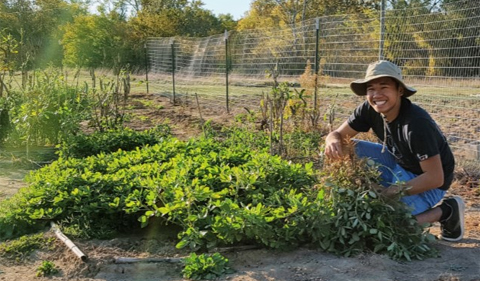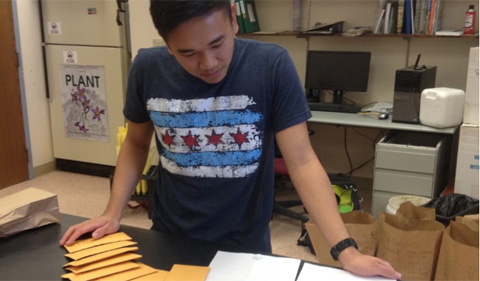by Kristin Distel
Senior Jordan Francisco ’18 is known among his friends as “the plant doctor”—an apt name for the Environmental & Plant Biology major who says, “Plants make up 90 percent of my life.”
Thanks to a four-day training session provided by OHIO’s College of Arts & Sciences, Francisco can add another credential to his name: Certified Interpretive Guide. Francisco describes the training as worthwhile and even essential for those who are interested in imparting knowledge to the public. Francisco is especially interested in promoting science through community outreach and public education.
“Specifically,” he says, “I want to talk about environmental problems, sustainability, and the importance of botany.”
Becoming a certified interpretive guide is a key step in achieving these goals.
“I am glad to have utilized the free training through the College of Arts & Sciences. It usually costs around $200. I learned many useful skills and tools to make a successful, engaging, and hopefully an impacting program, whether that be a tour of a nature preserve or a special topic presented to a group,” he remarks.
‘I Learned What Interpretation Is All About’
Through this training, Francisco learned to bring his skills and knowledge to people who may not have extensive knowledge of his chosen area of study—sustainability and botany.
“I learned what interpretation is all about. An interpreter is a special kind of storyteller,” he states.
An increasing number of employers, such as national parks, are interested in hiring employees who have received formal training in interpretation.
“The National Association for Interpretation’s CIG program is a valuable certification that many occupations relating to tour guides or public relations are starting to require of their employees,” Francisco notes. Completing this training during his undergraduate career will give Francisco an edge in the job market.
Currently, he is interested in joining a national lecture circuit that emphasizes the importance of botany in public education. He is further interested in joining Teach for America, a possibility that prompted him to become a certified interpretive guide.
“I saw this certification as an opportunity to learn how to engage and convey information which would help when teaching a group of students,” he remarks.
“In the CIG course, you not only learn what it means to be an interpreter but also why we need interpretation,” Francisco states. “Without effective interpreters, the public would miss out on opportunities to expand their viewpoints and outlook on life. This certification helps an individual organize and deliver an enjoyable, relevant, and inspiring tour or presentation. During the four-day training session, I could experiment and see what works for me in how to deliver an effective program.”
Becoming a Better Public Speaker
The CIG course helps students hone their interpersonal and public speaking skills—essential proficiencies for those who are interested in public education and community outreach.
“I learned how to be a more welcoming and approachable person when it comes to interacting with outreach programs. This comes in handy since I am a College of Arts & Science Student Ambassador,” Francisco states.
Rather than bombarding an audience with a list of facts, he explains, an interpreter must make a concept both interesting and engaging for the audience. In his future public talks on sustainability, for example, he would present facts so that they audience could relate to the topic and see how it affects their lives.
“It is important to engage the audience and get them to think of and ask questions. At the end of my presentation, I would hope that my audience leaves with a better understanding of what sustainability is and for them to do further research or commit to sustainable life improvements,” he remarks.
Francisco notes that it is also necessary to tailor one’s presentation content and style to different demographics, including people of varying ages and geographic areas.
“Conveying a meaningful presentation to an audience is no easy feat. As with any other profession, you need training to learn how to efficiently and correctly do this job. Training in this program helps expose the trainee to interacting with all kinds of people,” Francisco says.
Putting Internship Skills to Work
During the CIG training, Francisco learned new strategies for conveying complex scientific information, including lessons he learned at his various internships.
“I interned over Summer 2017 under the joint Food Studies Theme and PBIO department with Dr. Art Trese as a sustainable agriculture intern. I worked at the West State Research Gardens at OHIO, where I helped maintain a farm production using sustainable practices. So, I helped maintain, grow, and harvest fruits and vegetables that would eventually be sold at the Atrium Café or to a local business that requests specific produce.”
Through becoming a certified interpretive guide, Francisco is now better prepared to share information about sustainability and farming practices to the general public.
“The real goal is to be the spark and hopefully inspire the audience to think and evaluate the special topic critically,” Francisco says.
Confidence and Constructive Criticism
At the close of the four-day seminar, trainees each give a presentation in order to assess their skills and put into practice the information they have learned. Francisco explains that the constructive criticism and advice, provided in an encouraging environment, prompted everyone to learn and to excel.
“Applying what I learned and receiving constructive criticism is something I truly valued coming out of this certification program. I came out overall a better and more well-rounded person, fully capable of talking in front of a group of people and giving an engaging talk.”






















Comments